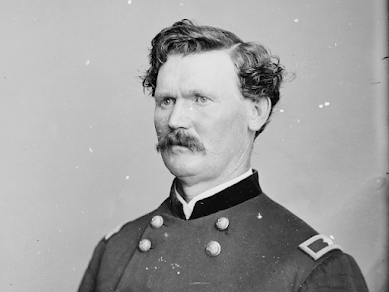The Cafe' [Think Tank]- Freedmen's Bureau
Freedmen's Bureau
Photograph of engraving of Colonel Robert Kingston Scott, 68th Ohio Volunteer Infantry (Civil War), chief of South Carolina's Freedmen's Bureau, as well as governor of that state, ca. 1860-1869. |
The Bureau of Refugees, Freedmen, and Abandoned Lands was to provide displaced persons of the South, including both whites and blacks, with assistance at the end of the American Civil War.
The United States government formally created the Bureau of Refugees, Freedmen, and Abandoned Lands on March 3, 1865. Better known as the Freedmen's Bureau, the War Department oversaw the agency. General Oliver Otis Howard served as the bureau's director. The Freedmen's Bureau opened schools to provide newly freed African Americans and whites with educational opportunities. This agency also helped find employment for people of all races.
In 1866, the United States Congress voted to continue the Freedmen's Bureau. President Andrew Johnson vetoed the Congress' action. Johnson did not desire to punish all white Southerners for the Civil War. He blamed the planter elite for the conflict. Johnson wanted to reunite the nation as quickly as possible, while punishing the leaders of the rebellion. President Johnson, as did many white Southerners, believed that the Freedmen's Bureau was an attempt by Northerners to make African Americans superior to whites in the South. The Freedmen's Bureau's actions escalated tensions between the North and the South during Reconstruction.
Johnson's veto incensed the Radical Republicans, including those from Ohio, in Congress. These men sought to punish the South for the Civil War and also sought to build a loyal political following among African Americans. The Congress overturned Johnson's veto. Following the congressional elections of 1866, the Republican Party controlled more than two-thirds of the seats in both houses of Congress. As a result of the Republican victory in 1866, the Congress now dictated how reconstruction of the Union would proceed. In effect, the Congress rejected Johnson's plan for Reconstruction and implemented a much harsher policy toward white Southerners.
Historians debate how successful the Freedmen's Bureau was in assisting both whites and blacks at the end of the Civil War. The agency did establish numerous schools across the South, but white Southerners routinely prevented African Americans from attending the schools through threats of violence. In many cases, white Southerners also forced the schools to close by threatening the teachers. Fearing for their lives, the teachers, many of whom were single white women from the North, fled for their lives. The Freedmen's Bureau also found jobs for African Americans in the post-war South, but unfortunately for the blacks, usually these jobs were working as farm laborers or sharecroppers for their former owners. Although all races could receive aid from the Freedmen's Bureau, most Southern whites refused to seek assistance from the agency.
Follow our podcast at youtube: The Cafe' University [Think Tank]
Y'all don't hear me though;
This is
- WillyBill,
...And I'm out!
PLEASE LIKE SHARE, FOLLOW, COMMENT BELOW & JOIN US (Subscribe) :
I know some of you are mainstream media outlets coming here to get your talking points. It's ok I'm not upset I want this info out there no matter who it comes from. All I ask is that you give me credit for my hard work.
If you have celebrity news, political news, or if you are an artist or entertainer and want to share contact us.



Comments
Post a Comment